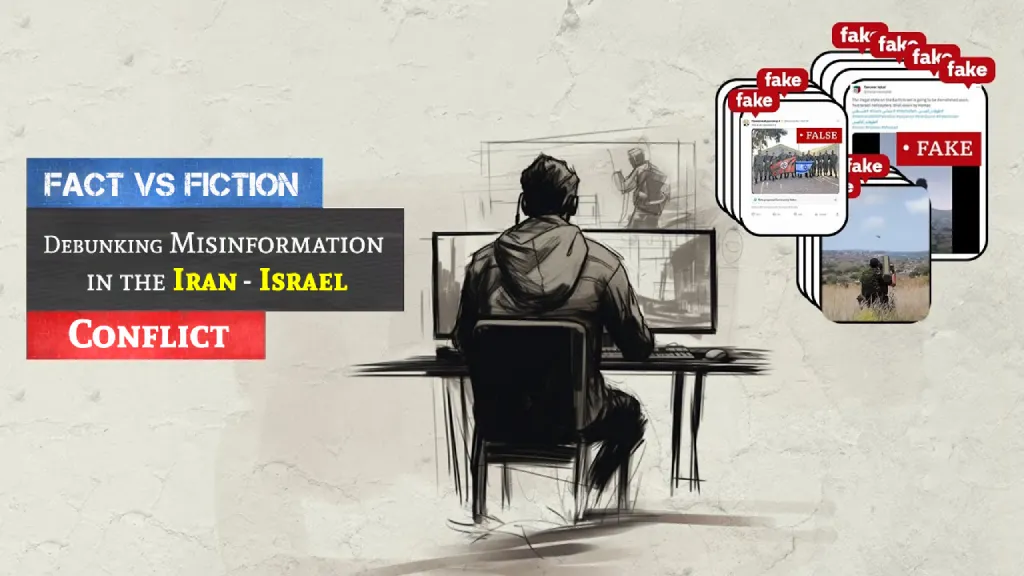
As Iran-Israel Conflict further boils up, the world has witnessed a gradual surge in misinformation. The propaganda war between the two nations has reached a fever pitch, making it increasingly challenging to separate fact from fiction.
Misconception 1: Iran is the Sole Aggressor
One prevalent narrative portrays Iran as the sole aggressor in the conflict, bent on the destruction of Israel. While Iran’s rhetoric towards Israel is undoubtedly hostile, the reality is more nuanced. Iran supports proxy groups like Hezbollah and Hamas, which have carried out attacks against Israel. However, painting Iran as the sole villain ignores Israel’s own military actions and regional power dynamics.
Misconception 2: Israel’s Actions are Always Defensive
Israel often frames its military operations as necessary defensive measures to protect its citizens from external threats. While Israel faces legitimate security concerns, its actions in the occupied territories and airstrikes in neighboring countries like Syria have sparked controversy. Critics argue that Israel’s military interventions often exacerbate tensions and fuel further violence, rather than promoting lasting peace.
Misconception 3: The Conflict is Primarily Religious
While religious identity plays a significant role in the Iran-Israel conflict, reducing it to a purely religious struggle oversimplifies a complex geopolitical landscape. Historical grievances, territorial disputes, and strategic interests also shape the dynamics between the two nations. Viewing the conflict solely through a religious lens ignores the political, economic, and social factors at play.
Misconception 4: There is No Room for Diplomacy
Amidst escalating tensions, some voices assert that diplomacy has no place in resolving the Iran-Israel conflict. However, history has shown that dialogue and negotiation can lead to breakthroughs, however incremental. The recent nuclear talks between Iran and world powers demonstrate the potential for diplomatic engagement, even in the face of deep-seated animosities.
Misconception 5: Media Bias is Inevitable
In an era of heightened polarization, media coverage of the Iran-Israel conflict is often accused of bias. However, not all media outlets are equally guilty of sensationalism or partisanship. Seeking out diverse sources and cross-referencing information can help mitigate the influence of biased reporting, enabling a more nuanced understanding of the situation.
Getting deeper into the political dynamics of the Iran-Israel conflict unveils a web of intricate alliances, strategic calculations, and regional power struggles. Here are additional insights to shed light on the complexities of this enduring confrontation:
1. Proxy Warfare and Regional Influence
Iran’s support for proxy groups like Hezbollah and Hamas is not merely ideological but serves as a strategic tool to extend its influence in the region. By backing these groups, Iran can exert pressure on Israel indirectly while maintaining plausible deniability. This proxy warfare adds a layer of complexity to the conflict, making it challenging to address through conventional diplomacy.
2. Nuclear Ambitions and Security Concerns
Iran’s nuclear program remains a point of contention, with Israel viewing it as an existential threat. Despite international efforts to curb Iran’s nuclear ambitions through diplomatic means, Israel has not ruled out military action to prevent Iran from obtaining nuclear weapons. This tension underscores the high stakes involved and the delicate balance between deterrence and escalation.
3. Geopolitical Alignments and Balancing Acts
The Iran-Israel conflict is not isolated but intersects with broader geopolitical dynamics in the Middle East. Israel’s warming relations with some Arab states, driven by shared concerns about Iran’s regional influence, add a new dimension to the conflict. Meanwhile, Iran’s alliances with countries like Syria and Russia further complicate the geopolitical landscape, creating shifting alliances and rivalries.
4. Humanitarian Implications and Civilian Suffering
Amidst the geopolitical maneuvering and military posturing, it’s essential not to lose sight of the humanitarian implications of the Iran-Israel conflict. Civilians on both sides bear the brunt of violence and instability, with displacement, loss of life, and economic hardship becoming all too familiar realities. Addressing the humanitarian dimension of the conflict is crucial for fostering long-term stability and reconciliation.
5. Multilateral Diplomacy and International Engagement
While the Iran-Israel conflict may seem intractable at times, there are opportunities for multilateral diplomacy and international engagement to make a difference. Initiatives such as the Iran nuclear deal (Joint Comprehensive Plan of Action) demonstrate the potential for diplomatic solutions, albeit with inherent challenges. Engaging regional stakeholders and leveraging international institutions can help create pathways for dialogue and de-escalation.
The Palestinian Question
The Israeli-Palestinian conflict remains a core issue, with the status of Jerusalem and the rights of Palestinian refugees unresolved. The United States’ recognition of Jerusalem as Israel’s capital has further complicated the peace process, which has been stalled for years. A comprehensive resolution to the conflict must address the legitimate claims and aspirations of both Israelis and Palestinians.
Palestine’s Role in the Iran-Israel Conflict: A Complex Nexus
The Palestinian territories, particularly the Gaza Strip and the West Bank, occupy a central role in the broader context of the Iran-Israel conflict. The relationship between Palestine and Iran is multifaceted, shaped by ideological alignment, strategic interests, and shared opposition to Israel’s occupation. Here’s a deeper exploration of Palestine’s role in the conflict:
A. Hamas and Iranian Support
Hamas, the Islamist militant group governing the Gaza Strip, has received significant support from Iran, including funding, weapons, and training. For Iran, backing Hamas serves as a means to challenge Israel’s dominance in the region and project its influence through proxy warfare. However, Hamas’ ties with Iran also complicate its relations with other regional actors, including Palestinian factions and Arab states.
B. Fatah and Palestinian Politics
In contrast to Hamas, the Palestinian Authority, led by Fatah, has historically maintained closer ties with Arab states and pursued a diplomatic approach towards Israel. While Fatah’s leadership has sought negotiations for a two-state solution, its efforts have been hampered by internal divisions, Israeli settlement expansion, and U.S. policy shifts. Iran’s support for Hamas occasionally strains Fatah’s relations with Tehran, highlighting the complexities of Palestinian politics.
C. Jerusalem: A Flashpoint of Tension
The status of Jerusalem, particularly the contested holy sites in the Old City, remains a focal point of tension between Israel and the Palestinians. Iran’s rhetorical support for Palestinian aspirations to reclaim Jerusalem resonates with many Palestinians, bolstering its image as a champion of the Palestinian cause. However, Iran’s involvement also adds a geopolitical dimension to the conflict, exacerbating regional rivalries and complicating prospects for peace.
D. The Gaza-Israel Conflict: Cycles of Violence
The Gaza Strip, under Hamas’ control, has been a recurrent flashpoint in the Israel-Palestine conflict, marked by periodic escalations of violence and devastating military confrontations. Iran’s support for Hamas, including the supply of rockets and military technology, contributes to the cycle of violence and further entrenches the conflict. Efforts to broker ceasefires and humanitarian aid are often stymied by broader geopolitical considerations and power struggles.
E. Palestinian Aspirations for Statehood
Amidst the geopolitical maneuvering and armed confrontations, the Palestinian people’s aspirations for statehood and self-determination remain unfulfilled. The Iran-Israel conflict, with its regional ramifications and proxy dynamics, both empowers and constrains Palestinian political agency. Achieving a just and lasting resolution to the conflict necessitates addressing the underlying grievances of the Palestinian people and recognizing their rights within the framework of international law.
Separating fact from fiction in the Iran-Israel conflict requires critical thinking and a willingness to challenge preconceived notions. By examining the complexities of the conflict with a discerning eye, we can move towards a more informed and constructive dialogue.
Palestine’s role in the Iran-Israel conflict underscores the interconnectedness of regional dynamics and the enduring struggle for justice and sovereignty. As efforts to resolve the conflict continue, acknowledging the complexities of Palestinian politics and aspirations is essential for fostering genuine progress towards peace and stability in the Middle East.
References and Resources:
- Institute for Palestine Studies: https://www.palestine-studies.org/
- Al-Monitor: https://www.al-monitor.com/
- Middle East Eye: https://www.middleeasteye.net/
- The New Arab: https://english.alaraby.co.uk/
- Palestinian Center for Policy and Survey Research: https://www.pcpsr.org/
- Carnegie Endowment for International Peace: https://carnegieendowment.org/
- International Crisis Group: https://www.crisisgroup.org/
- The Washington Institute for Near East Policy: https://www.washingtoninstitute.org/
- United States Institute of Peace: https://www.usip.org/
- Brookings Institution: https://www.brookings.edu/
- Al Jazeera: https://www.aljazeera.com/
- BBC News: https://www.bbc.com/news
- Council on Foreign Relations: https://www.cfr.org/
- Middle East Institute: https://www.mei.edu/
- United Nations: https://www.un.org/


3 comments
[…] The conflict between Iran and Israel has been brewing for decades, with tensions escalating in recent years. While the two nations have not engaged in direct combat, their proxy forces have been clashing in a shadow war that threatens to destabilize the entire Middle East. Let’s delve into the complex web of proxy forces and explore their role in the Iran-Israel conflict. […]
Hello,
for your website do be displayed in searches your domain needs to be indexed in the Google Search Index.
To add your domain to Google Search Index now, please visit
https://www.domainsubmit1.pro
I know this subject line sounds so hype…
But it’s true, making money shouldn’t be “hard”
It’s quite easy if you have the right system…
This brings us to today’s topic…
My good friend Venkata just opened the doors to his newest app, Blink…
This little app blasts your Amazon affiliate links with thousands of clicks… (Or you can drive these traffic to your website)
Resulting in hundreds of profits every single day…
With it, you don’t need to write reviews, create websites, create videos, or none of that BS…
You just enter your Amazon affiliate link, and that’s it…
Now, you sit back and enjoy while Blink does all the work for you…
Click here now and watch how Blink can do all of that and more in just seconds >>
Cheers,
Edwin Hill